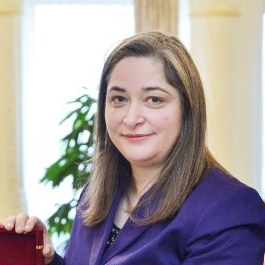News
Hanekom invites Palestinian tourism minister on official visit
Despite Palestine not being recognised internationally as a country, the South African government welcomed Palestinian Minister of Tourism and Antiquities, Rula Maa’yaa, to South Africa on an official visit earlier this month.

JORDAN MOSHE
Maa’yaa was invited by South African Minister of Tourism Derek Hanekom. The office of the South African minister confirmed that the visit on 11 and 12 September was official, and included a bilateral meeting between the two ministers to discuss co-operation in tourism.
“The ministers will also sign a memorandum of understanding to express the strong ties of friendship and mutual support between the people of South Africa and Palestine,” said Nurunessa Moolla, Chief of Staff for the Ministry of Tourism.
Given that Palestine is not defined by international law as a state, questions surrounding the true significance and motivation for this visit.
Along with eighteen others, Maa’yaa was sworn into office by Palestinian Authority (PA) President Mahmoud Abbas on 2 June 2014. Since June 2007, there have been two competing governments in the Palestinian territories in the Middle East, one in the West Bank, and the other in the Gaza Strip led by Hamas.
Though the government of the West Bank is generally recognised as the official government of the PA, Hamas has claimed to be the authority’s legitimate government.
Although Hamas was elected and took over the Gaza Strip in 2007, Abbas dismissed the Hamas-led government, and appointed Salam Fayyad as Prime Minister of the PA. The move wasn’t recognised by Hamas, resulting in the two separate administrations – the Fatah-led Palestinian Authority in the West Bank, and a rival Hamas government in the Gaza Strip.
The reconciliation process to unite the Palestinian governments has made some progress over the years, but has thus far failed to result in re-unification.
Under these circumstances, what would Maa’yaa’s true role be? According to analyst Nir Boms, while Palestine is not yet a state, the PA is considered to be a state in the making, and this has ramifications for the roles played by ministers.
“The PA is a member of many international bodies,” said Boms, a research fellow at the Moshe Dayan Center at Tel Aviv University, and at the International Centre for Counter Terrorism in Hertzliya. “It sees itself as a state in the making, and does whatever it can to support that image. As such, it’s no surprise that it makes efforts to engage in international relations with other countries which may recognise it.”
Boms said that when the United States recently announced its decision to close the Palestinian mission in Washington, the PA announced that it would try to find other means to deliver consular services to Palestinians in the country.
As Boms points out, however, it is challenging to deliver consular services to people of a state which does not formally exist. This, he says, is where people such as Maa’yaa play a role.
“The Palestinians need to find ways to offer and advance services which recognised countries offer, and by appointing ministers such as Maa’yaa, they can address such issues.”
As tourism minister for the West Bank, certain historical sites fall under Maa’yaa’s jurisdiction, and she may engage with countries like Jordan to establish travel agreements between the two locations. However, she does not have the power to issue visas.
Still, the question of how to view the minister’s visit to South Africa is slightly more complicated. “When a foreign minister is invited to any country, particular protocol and procedures apply,” said Boms. “This situation is unusual, but I expect the protocol applied would be very similar. However, I’m not sure what Maa’yaa can bring to the table where international agreements are concerned, as she doesn’t really have the power to give these effect. Her agenda is therefore difficult to gage.”
He continued, “The procedures followed really depend on the host country. South Africa can therefore accord her the necessary recognition if it so chooses. The PA naturally seeks such engagement and recognition, aiming to show that it is an internationally accredited player.”
Still, Boms stressed that in reality, there was nothing earth shattering about this potential recognition, as it wouldn’t change anything on the ground. “Her role is probably still limited to the symbolic realm,” said Boms. “As a de facto official, she may establish networks of connections and engage in dialogue, but hers is a symbolic position at the end of the day.”
Others differ, however. According to John Stremlau, visiting Professor of International Relations at the University of the Witwatersrand, the invitation issued to Maa’yaa suggests that the South African government is making a concerted effort to increase its engagement in the Middle East.
“The new government of South Africa under Ramaphosa is in an awkward position,” he said. “Since he spoke out against the violence on the border earlier this year, and recalled the ambassador in Israel, he has not taken much further action of late. The invitation issued to Maa’yaa may signal that the Ramaphosa administration wants to engage with the Palestinians, and to hear their voices.”
Like Boms, he said that the international legal ramifications of this matter were irrelevant. “This can still be a politically significant move,” said Stremlau. “Because Trump has almost outsourced his foreign policy on the Middle East to Netanyahu, neither of them are real addresses for dialogue for certain players. Certain countries are turning directly to the Palestinians to resolve issues in the region, and the invitation to Maa’yaa may be a manifestation of this.”
He concluded, “ There is a keen interest in, and passion for the Palestinian plight, amongst the ANC. The party’s commitment to the cause is real. Ramaphosa seems to be using whatever avenues he can to engage with them, and so this move really does make sense.”